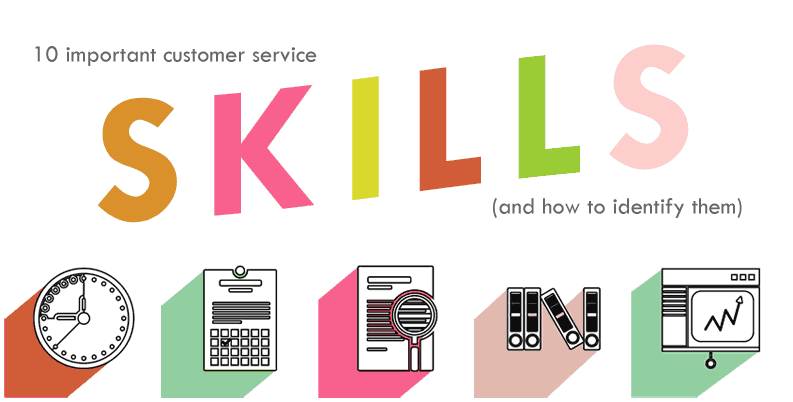-
10 Customer Service Skills to Look for in Employees
Mon, 10 Apr 2017, in Customer Service
Liking this post? You might also enjoy 10 Customer Service Metrics You Should Be Measuring

If you’ve ever hired for a customer service position, you know how important it is to settle on the right candidate. And since customer service employees are the face and voice of your brand, it’s definitely something that you can’t afford to get wrong.
Unfortunately, interviewing for customer service positions is nothing like evaluating for hard skills found in other roles. Worse yet, many businesses still see customer service is an easy, entry-level job which anyone should be able to do.
Yet the customer service stories we hear from Zappos to Disney go contrary to that. They empower employees with the right knowledge, skills and responsibilities to make important decisions on behalf of the company.
We’ve compiled a number of customer service skills you may want to look out for, how they work in the real world, and what to ask your potential hire.
1. Empathy
No matter how rapidly technology advances, and how life-like chat bots become, they won’t be able to replicate genuine, human connections.

And while an AI bot can automatically award you points for having a bad experience, it won’t really be able to get into the customer service details.
Empathy is powerful because it allows you to read between the lines and pick up hidden intentions that are not directly communicated. This helps support reps pinpoint and fix the customer’s concern before it actually becomes a full-fledged problem.
When a customer is having problems connecting to your service, don’t brush them off after a few failed attempts. Imagine this as an issue you could run in at home. Wouldn’t you want customer service to do everything humanely possible and stay with you until everything is fixed?What to ask:
- Was there a difficult customer situation where they had the responsibility to turn around?
- Was there a support interaction that truly “wowed” the customer?
- Did a customer ever turn out to be an advocate? How did it turn out?
2. Listening Skills
Everyone seems to agree that listening is important, but everyone has different opinions about what it means to be a great listener.

Aside from meaning different things to different people, listening skills are also difficult to quantify. Our attention levels aren’t just a collection of individual habits – they’re also impacted by external events. I know I’m not the best listener if I have something else on my mind or there’s a situation at home bothering me.
As with anything in life, practice makes perfect. Listening skills can be honed over time to the point where you’ll be able to pick up things customers want without thinking too much about it.
Customers might ask “How do I search?” or “Where’s setting x?”, but a smart support rep will hear “Your UI needs improvement”. It’s important to recognize these details, file them away and relay them to the project manager to consider. Then, contact the customer once the fix has been applied.What to ask:
- What is their level of experience in customer service positions?
- What is their body language when listening? Do you have their full attention?
- Are they giving you an unrelated answer? Are they not asking for clarification when needed?
3. Integrity
We prefer to deal with people we know, appreciate and trust. In the modern world of web-based businesses, one doesn’t have to know or even like you in order to do business with you – yet trust still reigns supreme.

The most important element in the equation is trust, and without it, customers won’t fully engage with you. In order to balance company policies and customer goals, support reps often need to rely on the right language and actions. In a world that over-promises and under-delivers, honesty is a desirable trait in any help desk employee.
The best customer service reps understand that they cannot fall hostage to either the company or the customer. However, many companies make the deadly mistake of promoting language like “your call is important to us” and “customers are our highest priority” while failing to live up to these claims in every sense of the word.What to ask:
- Was there a situation where they had to go against company policy to make a customer happy?
- Was there a time they were wrong and had to apologize to the customer?
- Did they ever have to ask management about improving support process / delivery?
4. Positive Attitude
Some people are natural “glass half full” types. They are comfortable in their own skin and are really passionate about making the customer feel great at every chance they get.

This is one of the most important characteristics of support representatives because it makes them who they are. The less effort a support agent exerts on being positive, the less stressed and burned out they will feel at the end of the day. While technical skills can be taught, an attitude change won’t come easily – it’s something that hinges heavily on personality.
Many brands subscribe to the approach of “hiring for attitude and training for skill” and for good reason. While it’s important for employees to adjust the tone of voice, language and behavior to a specific situation, you can’t do it forever. A positive attitude can’t be faked – as emotional labor (emotional effort required to do so) may be too great.What to ask:
- We all have “red flags” or “pet peeves”. What are the things that irritate them in life?
- When they have a bad experience at home or work, do they feel negative over other parts of their life?
- How do they reaffirm positive truths about themselves and their work?
5. Decision Making Ability
Customer service roles depend on solving problems at their core – resolving a wide array of issues customers may be faced with.

Using their cumulative knowledgeable of past interactions, skilled support agents are able to promote customer loyalty, apply upgrades and rewards all at once. Aside from being a productive use of everyone’s time, first contact resolution rates rise without compromising the quality of support interactions.
When scenarios fall outside of scripted ones, it becomes crucial for a support rep to know when to do something and when not to. Sometimes support reps need to make important decisions, such as whether to call or send an email. When support employees are empowered to make such decisions (this can include account management, escalation, reward programs) the customer experience improves as well.What to ask:
- In what case can they publish an article, perform a tutorial or set up an automatic response?
- In what cases would it be beneficial to pro-actively reach out to customers to warn them?
- What clues, feedback or complaints can they pick up from sample support interactions?
6. Thinking on Your Feet
Ask any support employee and they’ll tell you no matter how long you work in support, no interaction is ever the same.

Too often, customers act unpredictably and situations not covered by the company playbook emerge. So a truly talented support representative – aside from being a people person and a problem solver – also needs to be make the right decision quickly.
One UK-based mortgage company divided customers into 4 personality types to help service reps assess situations better. They divided customers into “controller”, “thinker”, “feeler” or “entertainer” personalities and designed support guidelines for each. This strategy proved to reduce repeat calls and increased customer satisfaction.
A colleague shared an experience at a particular hotel she was visiting. As she was waiting for her luggage, the reception clerk made small talk, asking what brought her to Boulder. It was an innocent question that led to them discussing everything from the weather, their in-laws and dealing with noisy children. In the end, this experience stuck out in her mind long enough for her to recommend the hotel to those in her social circle.What to ask:
- Are they comfortable with making decisions that could extend beyond their responsibilities?
- Did they ever tell a customer “no”, yet offered a workaround that solved the problem?
- Were there support interactions that generated actionable feedback?
7. Being Patient
Customer service tends to be an emotionally draining and sometimes even thankless job. As a result, keeping your resolve is an important character trait of every support employee.

Customers reach out to support when they are stressed and confused, so if the problem isn’t solved quickly, they get irate. If the problem does get solved quickly, the act of calling support and waiting is annoying in the first place.
While speed is important in customer service, customers don’t want the quality of support to be compromised. Smart support reps know how to keep the balance just right while being on the customer’s good side.
Don’t be afraid to spend quality time with the customer. Take the time to dig up personal information, find out how they’re using the product and what their objectives are. Providing the customer with a personal and unique experience won’t seem like a chore and they’re less likely to notice the length of the support interaction.What to ask:
- How would they reassure an impatient, irrational or upset customer?
- What are some examples where they reduced customer effort?
- How do they keep customers engaged during downtime or long waiting periods?
8. Persistence
When you choose to set yourself apart with good customer experiences, your are unwittingly making a decision to do something that isn’t easy.

An important character trait of being persistent is being able to stand your ground in uncomfortable situations. This may include having to decide whether a customer is being honest or deceptive in their language, actions or intentions.
Someone who has a natural knack for seeing things through won’t abandon requests mid-way, switch channels or throw the hot potato to the manager – actions that go contrary to providing a great experience. Look for candidates who have an ability to influence the customer support interaction and don’t stop until the customer is satisfied.
The right support representative should know how to nudge, upsell and close properly. This doesn’t mean that support reps are supposed to push for a sale – rather, they should know how to influence a customers so they make a decision that’s in the company’s as well as the customer’s interest.What to ask:
- When is the right time to hang up or finish the support interaction?
- Have they ever made upsell, downsell or a recommendation based on the customer’s real needs?
- Did they ever have to call out a dishonest, abusive or unreasonable customer?
9. Product knowledge
If your support rep doesn’t have a thorough, hands-on knowledge of the product (this also includes extensive technical and troubleshooting knowledge), they won’t be able to help the customer, either.

A good customer service employee will know when a customer is having trouble. They will be able to pick up the customer’s pain points and use their knowledge of product capabilities to address them.
Since customers usually contact support because they don’t fully or correctly understand the product, employees will be able to make better recommendations if they’re familiar with benefits (and shortcomings) of the complete product line.
Even if they seem like second nature around the office, many concepts behind your product can be really confusing to customers. Richard Feynman and Carl Sagan were famous for being able to easily explain complex concepts to people from all walks of life. This ability greatly boosted their authority on the subject, never mind their popularity.What to ask:
- What are their hobbies? Do they have any personal interest in your product?
- Were there any customer service situations which were solved by their knowledge of the product?
- What was the most difficult thing they had to learn in a customer service role?
10. Progress Mindedness
One fatal mistake most businesses make is thinking of customer service as a dead-end or entry-level job.

In fact, companies known for their customer service (think Zappos and Disney) go the opposite way – they inspire employees to take customer engagement seriously – in making important decisions and reinvesting in employee development.
Most prospective employees and management care about career development. Some have vertical growth in mind (cross departmental) or horizontal growth (utilizing their skills to grow with the company).
Any time you sincerely want to make a change, the first thing you must do is to raise your standards. When you change what you expect out of yourself, others will take notice – especially your customers.What to ask:
- Where do they see yourself five years from now?
- How do they define success in their opinion?
- What do they consider the most important thing in their career?
Make it easy for the best to find you
Good candidates tend to know they’re good. That’s why they’re looking for forward-thinking companies with great culture and growth potential. When outlining your job description, ensure you communicate your culture, values and describe your work environment as clearly as possible.
Customers won’t buy from a company they don’t trust. Employees won’t work for a company that isn’t connecting with them.You can’t expect to get what you want without putting yourself out there. Instruct everyone the importance of putting the best foot forward and think of recruitment as a whole company effort:
- Add that you’re hiring in email correspondence and signatures, ie: “We’re Hiring!”
- Indicate that you’re hiring in personal and in company social media profiles.
- Ask your customers for referrals and provide referrals for those that ask, too.
Hiring the best in any field is hard work – but finding the right people is only part of building a great team and getting customers to stick with you. So if you’re looking for big shoes to fill, it’s your responsibility to dissect the unique skills and talents employees bring to your company.
It can mean a difference between hiring a helping hand or a go-getter who will make customers fall in love with your company.
Read More: Picking Help Desk Software: Is It Even Worth Your Time?
Tags: customer service skills, employees, tips










